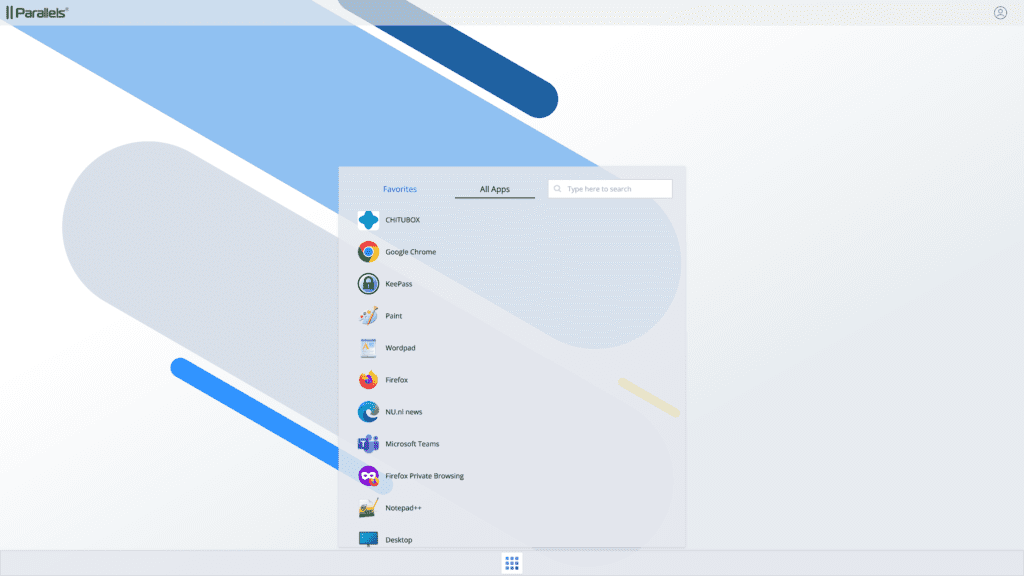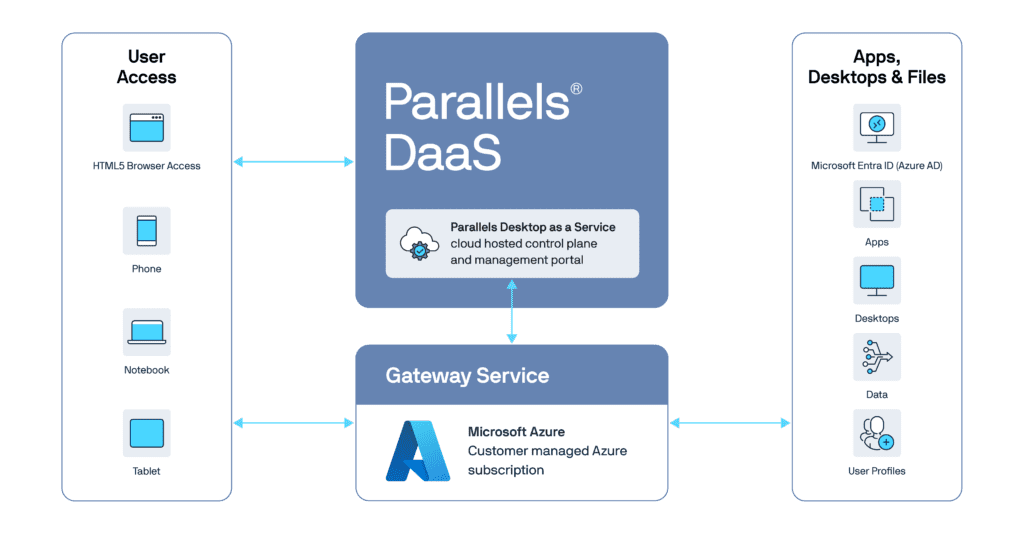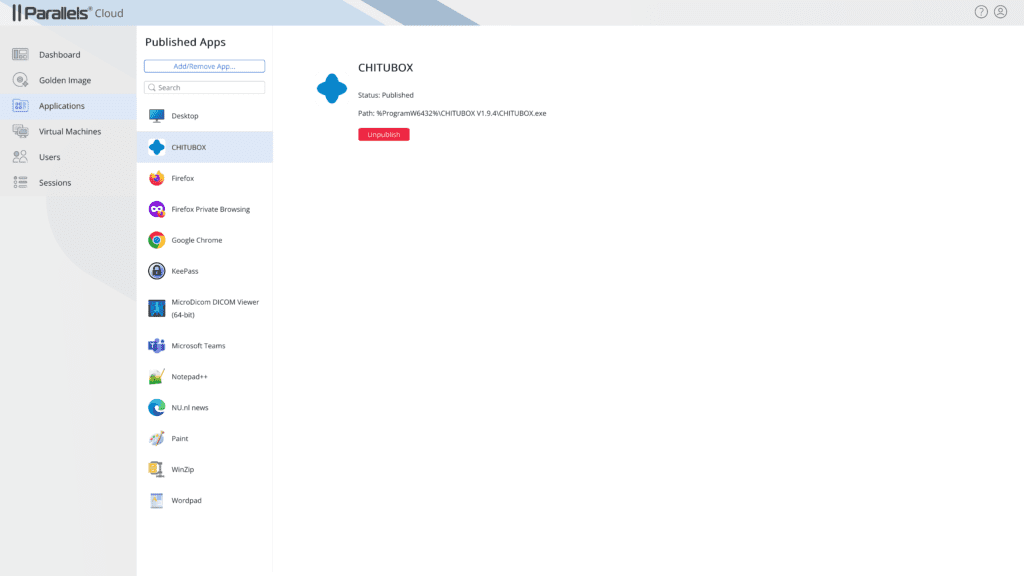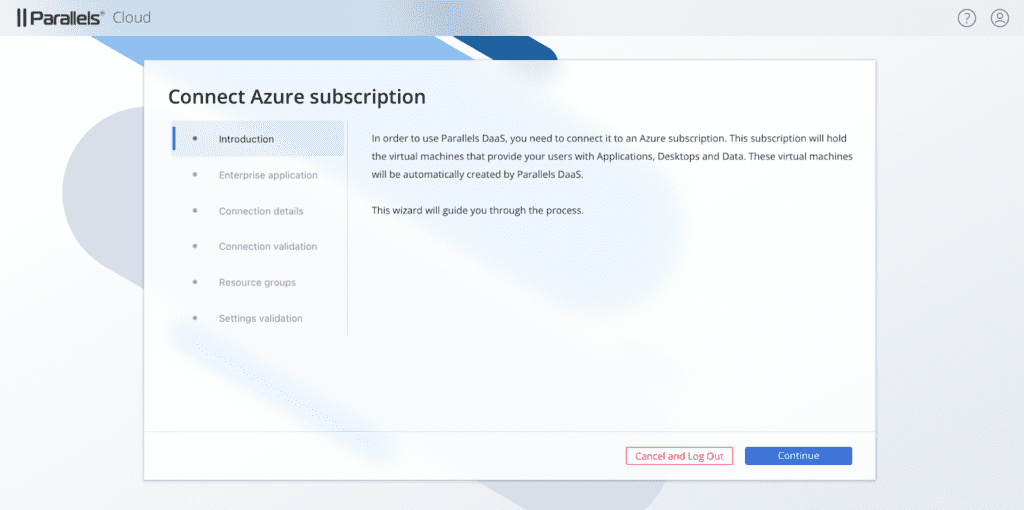
Announcing our new product offering, DaaS: Unleash the power of the cloud for remote and hybrid work
How businesses empower their workforce and partners to work has undergone a massive transformation over the last five years.
Hybrid working and remote working are here to stay.
Virtualized applications and desktop solutions have enabled this transformation and the shift from traditional VDI, hybrid, virtual PCs, and even app/desktop streaming.
Parallels has been a pioneer in delivering virtualization solutions for the last 25 years, with its product portfolio growing to meet specific, evolving customer needs and to respond to industry threats and concerns.
Today, Parallels introduces its latest, unique cloud-native service, Parallels DaaS (Desktop as a Service).
Agility and efficiency are crucial to success in today’s fast-paced business landscape.
Enter Parallels DaaS, the cloud-native solution poised to transform how you do business.
Say farewell to the complexities of user onboarding, application management, and user profile management.
Say hello to a world of seamless, secure, cost-effective, scalable virtual applications and desktop environments.
Ready to try Parallels DaaS now? Sign up for your free trial!
How does Parallels DaaS work?
Configuring traditional desktops is crucial for smooth operations.
Parallels DaaS provides a centralized desktop management solution that utilizes efficient software resources, allowing the IT team comprehensive control over resource scaling.

Parallels DaaS enables you to connect your apps and desktops to your Microsoft Entra ID, existing resource groups, application backends (such as virtual networks), and other customer-managed resources by bringing your own Microsoft Azure subscription.
If you need to, you can also configure Express Route or site-to-site VPN separately to access on-premises resources.
Managing applications, files, and documents has never been easier for users, thanks to the modern and intuitive user portal provided by the Parallels Client for Web.
This feature-rich tool allows users to access their resources directly from their web browser, regardless of location or device.

Users can also customize their favorite applications and manage their cookie policy settings, making it a flexible tool for remote access from PCs or mobile devices.
Additionally, Parallels Universal Printing ensures that printing from a remote desktop is no longer a challenge. Users can easily print to any printer connected to their local computer, regardless of location.
Parallels DaaS also eliminates the need for patch management or updates to software applications on individual devices. It enables IT admins to update all your assets simultaneously, allowing time to concentrate on more strategic tasks and enhance productivity.
Parallels DaaS architecture
Parallels DaaS is built on a microservices architecture, allowing for fine-grained functions that work cohesively together.
The use of containers offers isolation for improved security and performance.
These multi-tenant services are scalable and cost-effective for customers, making Parallels DaaS an excellent solution for businesses of all sizes.

One of the most significant benefits of Parallels DaaS is its secure and flexible architecture.
User session data is always contained within the customer-managed subscription, ensuring maximum security.
No user session data is tunneled in the Parallels DaaS solution, further enhancing security.
Parallels gateway services, which tunnel user sessions, run on customer-managed subscriptions providing scalability and an improved user experience as sessions are tunneled via the proximity of the session workload virtual machines hosting applications, desktops, and data.
Incoming traffic is load-balanced to the gateway services through vendor-managed load-balancing services hosted at the customer-managed subscription for optimal performance and transparent operations. This ensures that users have a seamless experience and can access their resources quickly and easily.
Seamless onboarding and access

User onboarding can be tedious and time-consuming, but not with Parallels DaaS. With the intuitive admin portal, IT admins can be set up and deploy new users with a few clicks.
This innovative solution offers users immediate access to feature-rich applications and desktops from any device.
It’s a user-friendly approach that simplifies your operations, ensuring your workforce runs without the usual hassles.
Agility and cost-optimizing
Parallels DaaS doesn’t just make your operations more straightforward; it also makes them more agile and helps to cost-optimize an IT deployment.
The flexible cloud-native architecture expands as you scale your resource requirements in your Azure subscription, offering a resilient and agile solution.
Parallels DaaS can help optimize user costs with built-in autoscaling features.
It will automatically switch off or remove entirely inactive users, so your Azure account is not being charged for resources that are not being used.
With access points closer to where your data and users reside, you’ll experience transparent operations and lightning-fast performance for your end users.
Managing users, not infrastructure
Parallels DaaS offers IT admins more time to focus on their workforce than the infrastructure.
As a cloud-native service, Parallels takes IT infrastructure management and security concerns off your plate.
The solution includes live dashboards and other management tools that remove complexity from daily IT tasks and make the everyday maintenance of your user population simple and easy to handle
Using nonpersistent desktops, Parallels DaaS provides users with a pristine desktop when they log on.
Any changes made during the session, except those retained through user profile management, are automatically discarded upon logoff. This ensures that the desktop remains clean and secure for the following user.
These nonpersistent desktops are created from a golden image, making it easier for IT to manage updates and company-wide application deployments.
Since users cannot alter desktop settings or install their own applications, the image is more secure.
In the unfortunate event of a hack or security breach, nonpersistent desktops can be rebooted to a clean state, ensuring that sensitive data is not compromised.
Streamlined migration

Moving your users to the cloud has always been challenging. Parallels DaaS streamlines the migration process and reduces the time-to-value with four simple steps:
- Register a Parallels DaaS account.
- Bring your own Microsoft Azure subscription.
- Install your line of business applications.
- Invite users to access their apps, desktops, and data.
With these steps, you can quickly transition to a cloud-based environment and scale your desktop infrastructure up or down to meet changing demands without compromising the user experience.
Robust security and compliance
In today’s data-driven world, security and compliance are paramount. Parallels Desktop doesn’t take these lightly.
While we provide the control, your data remains within your environment. Our unique architecture isolates the control layer from the data layer, providing an additional layer of data security with the Parallels Secure Gateway service, ensuring that data tunneling stays within your network.
Even more impressively, this gateway service resides in your environment while still being offered as a service, providing maximum security with minimal management overhead.
Predictable costs and unwavering support
Parallels DaaS also helps you reduce capital expenditure with its subscription-based model.
You’ll have predictable costs backed by a Service Level Agreement (SLA) that includes 24/7 customer support. This means you get reliability and peace of mind, knowing your business is in good hands.
The future of work
Parallels DaaS is the future of the digital workspace for many modern businesses.
It’s ideal for organizations looking to streamline their desktop infrastructure, introduce remote and hybrid working policies, and simplify desktop and application management.
Experience the power of Parallels DaaS and revolutionize your business today by embracing the cloud-native solution that is changing the game.
Say goodbye to complexity and hello to a brighter, more efficient future with Parallels DaaS.
For more information visit: www.parallels.com/products/daas.


